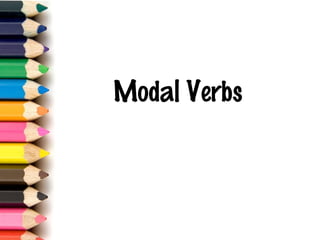
Modal verbs Role-Play Activity
- 1. Modal Verbs
- 2. What we will learn today • Recognize what modals are • Identify the variety of uses of modals in expressing meaning • Use modals in writing
- 3. What are modal verbs? • Helping verbs used together with base form of main verbs • Express different types of meanings
- 5. Where are modals put in a sentence? I shall be leaving when everything is done.
- 6. Where are modals put in a sentence? I shall be leaving when everything is done. Shall Be Leaving
- 7. Where are modals put in a sentence? will punish can swim
- 8. Base form verbs are used after modals will punish can swim
- 9. Base form verbs are used after modals will punish can swim I shall be leaving.
- 10. Base form verbs are used after modals will punish can swim I shall be leaving. He could walk yesterday
- 11. Modals have tenses Normally… Present Tense Past Tense Can Could Will Would Shall Should May Might
- 12. Modals have tenses But look at these sentences… She may be at home. She might be in school.
- 13. Modals have tenses But look at these sentences… I shall take part in the competition next month. I should be doing my homework instead of playing games.
- 14. Meaning of modals • Possibility --- How likely / Predictions • Obligation --- Is supposed to • Necessity/Insistence ---- Need to/ Have to • Ability ---- Is able to
- 15. Possibility • Indicate something is likely to happen. • Different degrees of likelihood Very Unlikely Very Likely Must Will Shall Can May Could Might
- 16. Possibility • Indicate something is likely to happen or to predict • Different degrees of likelihood Very Unlikely Very Likely Must Will Shall Can May Could MightCannot
- 17. Obligation • Used to indicate that an action is required because someone is responsible. Should: Not used as past tense of ‘shall’ Must: Used to give orders that someone is obliged to follow.
- 18. Necessity/Insistence • To indicate something that is needed by someone or insisted on by someone. Need to: When voicing out what is needed/ insisted on. Must: To insist on something to be done.
- 19. Ability • To indicate if something can or cannot be done. Can Cannot Could is used to express ability in the past. (Not to express likelihood in which it can used in present/past tense)
- 20. Group Activity • Work in your usual groups of fours and label yourselves 1 to 4. • Listen to all instructions carefully before moving off to collect materials/get into groups. • You will be practising how to use modals to show obligation, ability, necessity/insistence and possibility.
- 21. Instructions • Each group collect a set of materials which comprises 1 activity sheet and 1 pack of markers. • The activity will require the group to role play and think of what 4 different characters will say in unique situations to show obligation, ability, necessity/insistence and possibility. • Each member will present 1 role at the end of group discussion. • Discussion can only begin when the online timer starts ticking--- 10 minutes discussion time will be given!
- 22. Four Roles Mr. Judge: He is always right and always has advice for everyone. Superman: He has superpowers that enables him to do just about anything and everything! Bossy Betty: She is always demanding the others to give in to her and keeps insisting on her ways. Old Mr. Think-A-Lot: He is always thinking of things that might happen. OBLIGATION ABILITY NECESSITY/INSISTENCE POSSIBILITY
- 23. In a classroom Mr. Judge who is always right would say “ Superman who has superpowers would say “ Bossy Betty who demands a lot would say Old Mr. Think-a-lot would say “ __________________ _________ You should pay attention in class so you must not talk to your friends. I can remember how the human circulatory system work because I paid attention! I must talk to my friends in class even if it makes the teacher unhappy. I need to be heard! I will never be able to finish all that work by tomorrow. I could work faster if they would stop making noise. OBLIGATION ABILITY NECESSITY/INSISTENCE POSSIBILITY
- 24. MOST IMPORTANTLY • Ensure the volume of your group’s discussion does not affect the others. • Include everyone in the discussion and respect each other’s views. • Sound out to the teacher when the group has trouble agreeing to how things should be done. • Basic discipline please!